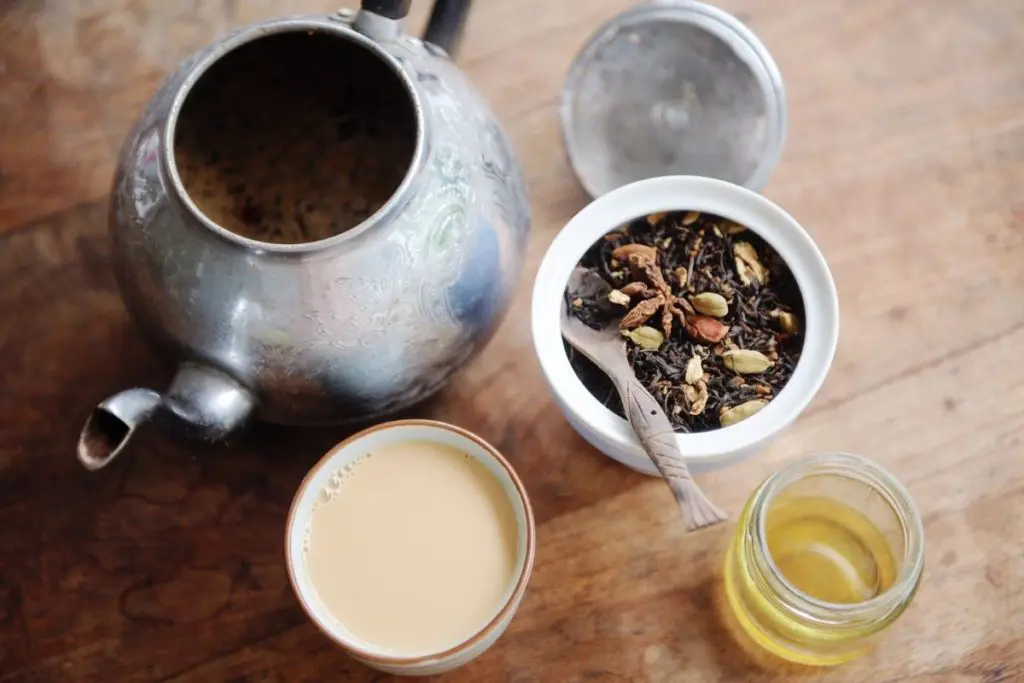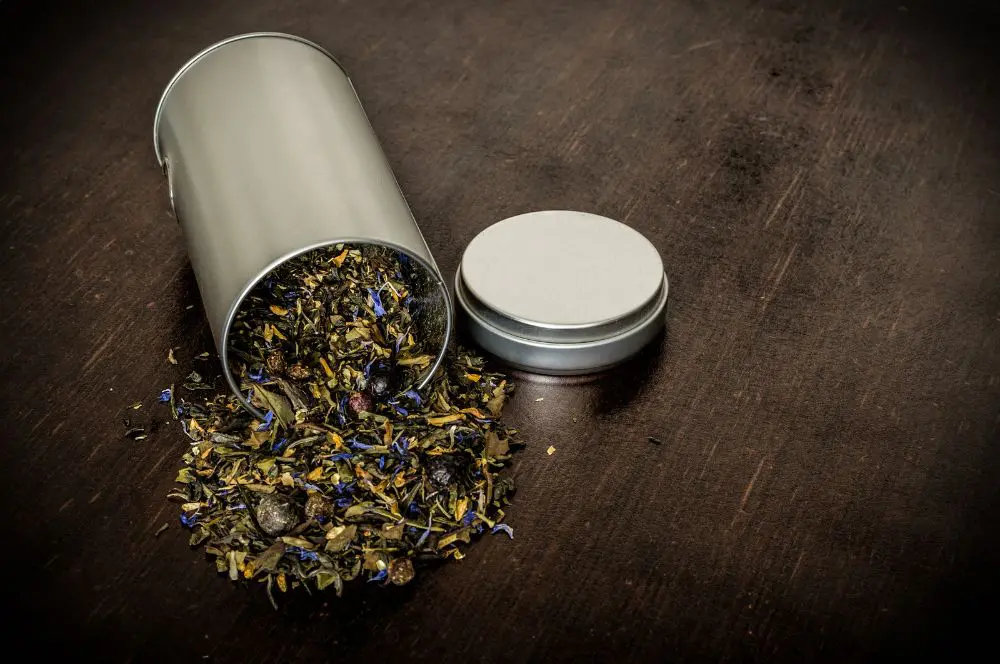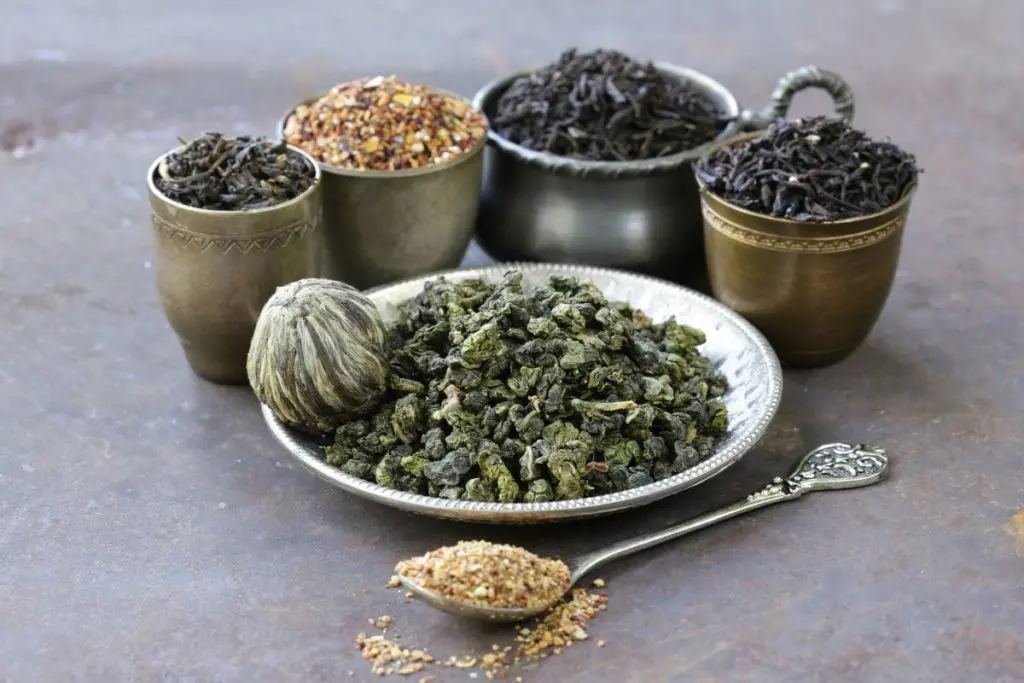Chai tea is a popular drink in the US, although it originates in India. In India, it is incredibly common and is technically called Masala Chai in its native country. The aromatic spices used in chai make it a perfect pair with some warm milk, which is what has made chai tea so popular in the US (chai latte, anyone?). Besides just tasting delicious, however, there are numerous benefits of drinking chai tea. Herbs and spices are known to generally be good for you, but chai tea contains several spices that are incredibly healthful.
If you want to learn about the many health benefits of chai tea ingredients, read on!
What’s in Chai Tea?
Various chai teas can have a wide range of spices in them. Still, the key spice is cardamom, usually accompanied by star anise, cinnamon, clove, and ginger. Some other spices such as fennel and coriander are often part of the aromatic tea. Still, they are not as common as the spices mentioned above.
For those of you wondering, does chai tea have caffeine — yes, it does. In one average-sized cup of chai tea, there is roughly 25mg of caffeine. Compared to a cup of coffee, this is only a quarter of the amount of caffeine. So, if you are especially sensitive to caffeine or don’t like the effects, you may want to avoid chai entirely or have a small cup’s worth.
The Benefits of Drinking Chai Tea: A Look at the Ingredients
Now that we’ve covered the basics about chai tea, let’s break down the benefits of drinking chai tea; based on the core spices.
1
Cardamom
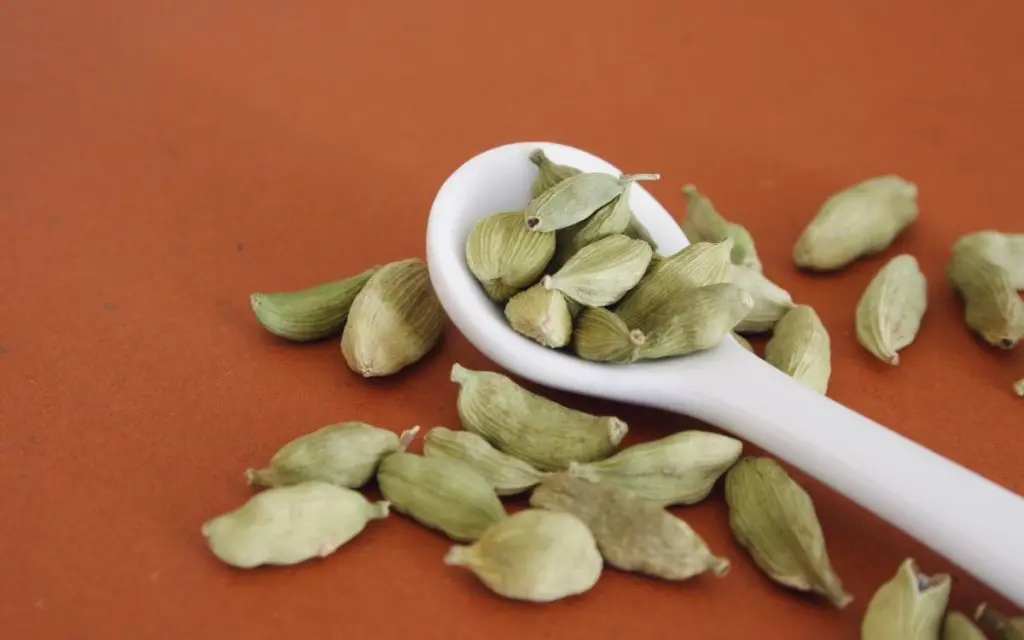
First on our list is the most important spice in chai tea: cardamom. So, what’s so great about cardamom? Where do we even start?
Lowers Blood Pressure
To start us off, scientists believe that cardamom may lower blood pressure. In one study, scientists administered 3 grams of cardamom powder a day to 20 patients newly diagnosed with high blood pressure. All of them had substantially lowered blood pressure by the end of the 12-week test. Additionally, all of their antioxidant levels were up by 90%. The best part? The test subjects had NO side effects! So if you ever are diagnosed with high blood pressure, use lots of cardamom in your food, and maybe consider sipping some chai tea on the regular.
May Help Prevent Cancer
There are some studies in which cardamom helped prevent cancer cells from continuing to grow. Mind you; these studies have only been tested on mice and in test tubes. However, in one study, mice who were exposed to a skin-cancer causing compound were split up. Half were given cardamom every day, and the other half were not. Only 29% of the mice who were given cardamom ended up getting cancer, while a whopping 90% of the control group did.
In another study, scientists found that upon administering cardamom to test tubes containing oral cancer, cancer ceased growing in the tubes.
Of course, while these are just studies, and cardamom has not been tested as a cancer-fighting substance in humans, these test results are incredibly promising. Needless to say, cardamom it certainly won’t hurt to ingest cardamom as a potential cancer preventative.
May Help With Ulcers
Cardamom is a known digestive aid and has been for thousands of years. However, most recently, it was discovered that it might aid in preventing stomach ulcers.
One study of rats proved that cardamom extract reduced the size of ulcers by 50% and prevented them entirely for some rats. The cardamom even proved to be more effective than anti-ulcer medication.
Just the Tip of the Iceberg
There are even more medicinal effects of cardamom, such as:
- Anti-inflammatory effects
- Anti-bacterial effects
- May improve breathing, especially for asthmatics
- May lower blood sugar levels
- Can help fight anxiety
- Protects the liver
2
Cinnamon
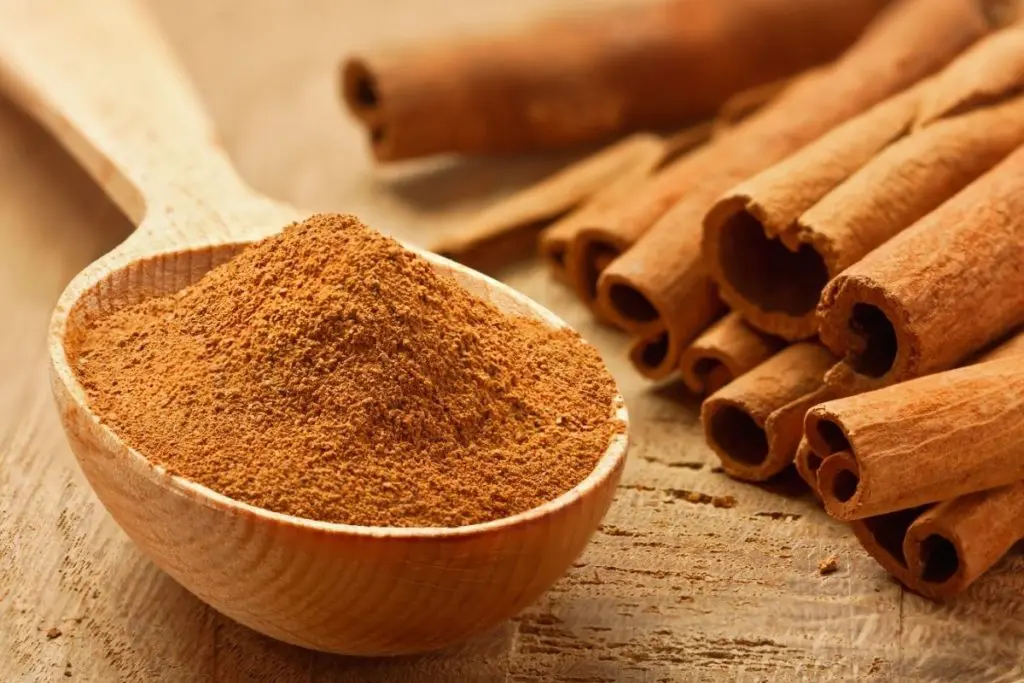
Cinnamon is another key spice in chai, and it has quite a few wonderful health benefits!
Anti-inflammatory Properties
According to some studies, cinnamon has potent anti-inflammatory properties due to its antioxidants.
Although inflammation is helpful when it comes to healing damaged tissues, it can become a big problem if it is chronic. Needless to say, if you have gout or any other inflammatory issue, consider using cinnamon in your diet (and drink a lot of chai tea!).
May Reduce Symptoms and Risk of Diabetes and Heart Disease
In one study, 60 people, half men, half women, all with type 2 diabetes were split into two groups of 30. Half were given a placebo pill, and half were given varying doses of cinnamon every day (1 gram, 3 grams, and 6 grams). Every single subject who took even the smallest dose of cinnamon had reduced levels of triglycerides, LDL cholesterol, and total cholesterol. It is worth noting that there was no effect on HDL cholesterol (which is the good kind of cholesterol as opposed to LDL).
Can Improve Insulin Sensitivity
This is excellent info for those who struggle with insulin resistance. The chromium and polyphenols found in cinnamon have been shown to improve glucose, insulin, and cholesterol levels in human patients. They are also incredibly helpful in insulin signaling, which means for those with insulin resistance, it may help combat it.
Even More Benefits!
This list is just scratching the surface of the myriad of health benefits you may reap from cinnamon. Here are just a few more potential benefits:
- Fights fungal and bacterial infections
- May help those with Alzheimer’s and Parkinson’s Disease
- Lowers blood sugar levels
3
Star Anise
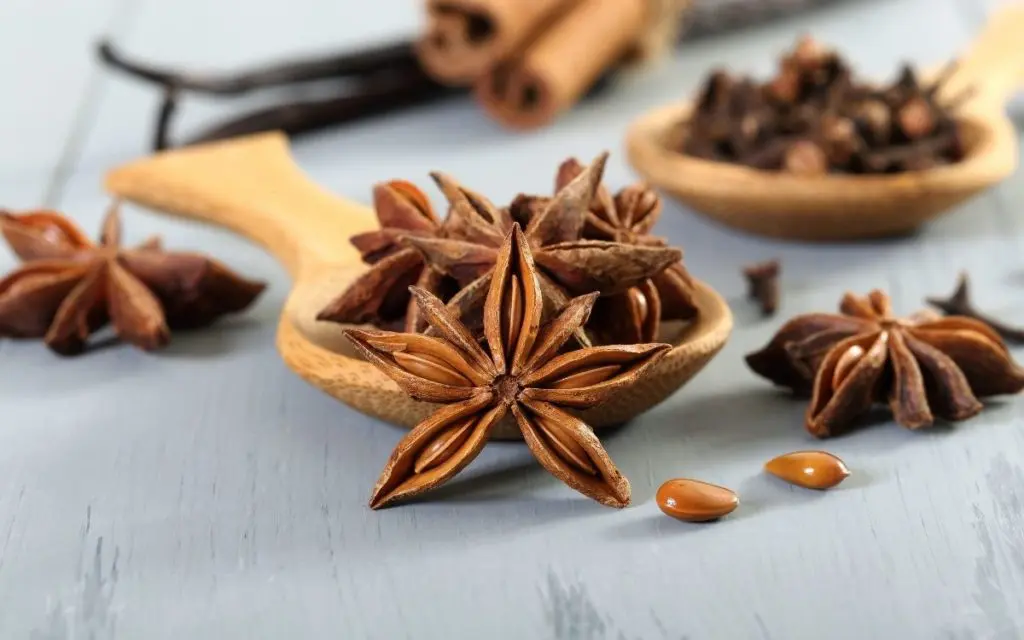
Let’s move on to our next main chai tea ingredient: star anise.
Antiviral Properties
Star anise is full of shikimic acid, which contains high antiviral properties. It is even a key ingredient in Tamiflu, a common flu medication. Although there is more research that needs to be done to uncover star anise’s full antiviral abilities, it is, at the very least, an aid in treating viruses such as the flu due to its shikimic acid content.
Anti-Bacterial Properties
It has been noted that star anise has some impressive anti-bacterial properties, as well as antiviral. One study has even shown that the extract from star anise is just as effective as antibiotics against various bacteria, specifically, drug-resistant ones. There needs to be more research to provide conclusive evidence. Still, it’s safe to say that star anise certainly won’t harm your ability to fight bacteria.
4
Clove
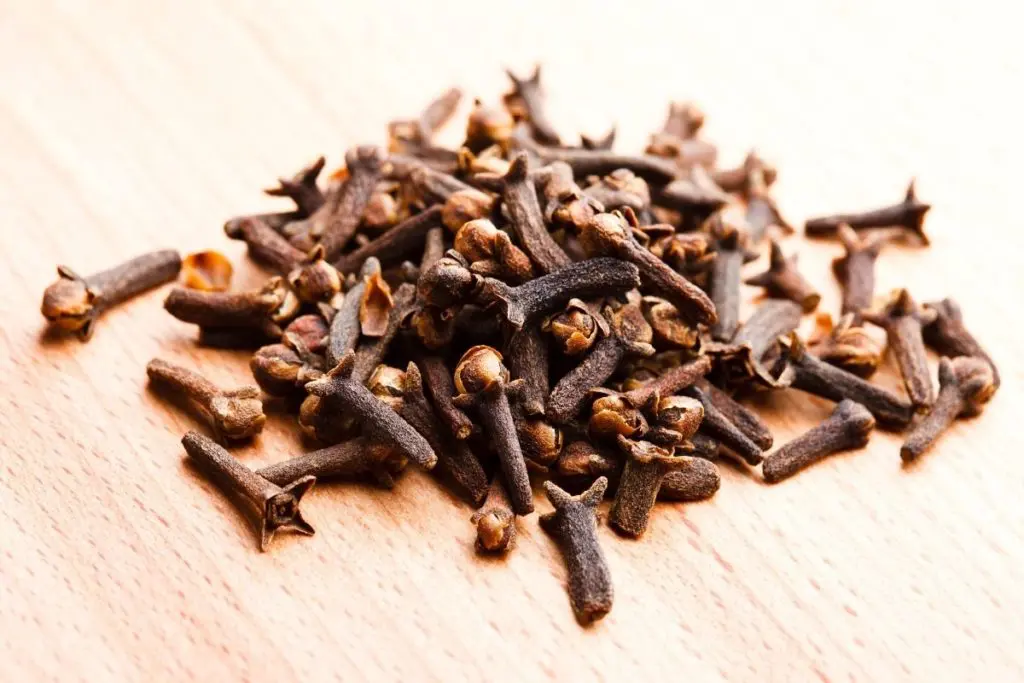
Clove is yet another spice packed with powerful antioxidants. Let’s list a few of the best health benefits of ingesting clove.
Anti-Inflammatory Properties
One of the most important components in clove is eugenol. Eugenol is the oil that is derived from clove and is proven to help with inflammation. When tested on animals, it helped with skin inflammation with no side effects!
Anti-Bacterial Properties
In one study, clove oil killed E. coli bacteria in a test tube. Of course, we need further testing on humans, but these are very promising test results.
In another study, human test subjects used a mouthwash made of tea tree oil, clove, and basil. It was very successful in killing bacteria in the mouth. The results insinuated that this herbal mouthwash is as effective as a storebought mouthwash.
Potentially Improves Liver Health
Eugenol is also capable of helping people fight fatty liver disease and help prevent it. When given to rats with fatty liver disease, it helped immensely by reducing inflammation, oxidative stress and improving the overall function of the liver.
This test was just done on rats, so human testing is needed to determine if it works for humans the way it does for rats. However, we can safely say that cloves are full of impressive potential health benefits.
More Ways Cloves Benefit You
- May help against cancer
- Good nutritional benefits
- Potentially helps regulate blood sugar
- May reduce stomach ulcers
5
Ginger
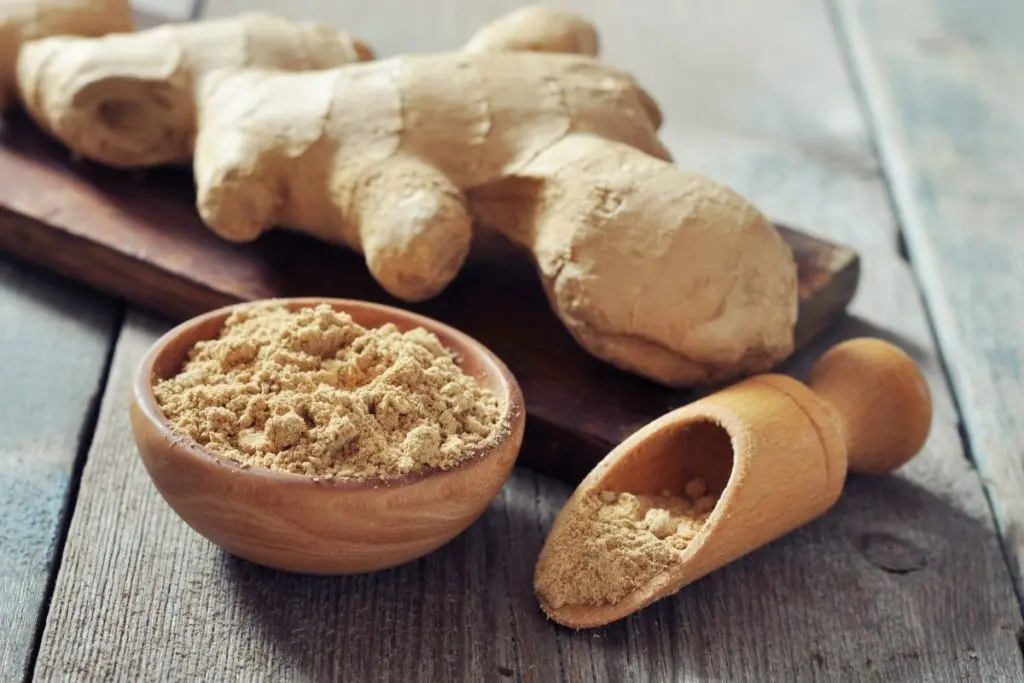
Although it is commonly used for health benefits throughout the world and has been for thousands of years for some cultures, here’s some solid scientific evidence for what ginger can do for your health.
Antioxidative Properties
Ginger is packed with antioxidants, and some studies reported that it can reduce oxidative stress in the body. In one study, rats fed ginger encountered less damage to their kidneys due to their oxidative stress. Although this is only a study on rats, the results are compelling. After some substantial tests on humans, hopefully, the results are similar.
Anti-Inflammatory Properties
One of the common claims about ginger’s benefits is that it has anti-inflammatory abilities. In one study, researchers reviewed 16 clinical trials attempting to see if ginger (as a supplement) could prevent or treat those with various inflammatory diseases. The review confirmed that ginger is incredibly effective in treating inflammation of all sorts. Their only note was that more research should be done to configure the correct dosages and the best way to administer it. Sounds exceptionally promising!
Even More Benefits:
- Nausea aid
- Weight loss
- May lower blood sugar
- May aid in menstrual cramps
Drink Tea and Be Merry!
Ultimately, this just scratches the surface of the many health benefits of chai tea ingredients. Since cold season is upon us, don’t allow your body to become susceptible to various viruses and the common cold. Be sure to keep your system protected with lots of healthful food, and don’t forget to use the benefits of chai tea to your advantage.
Further Reading

